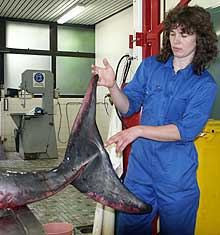|
Vets study rare whales
2nd May 2003
Massey News - Massey University, New Zealand
Quite a sight on an autopsy table, two rare whale carcasses have been extensively researched by IVABS marine mammal experts in preparation for preservation as skeletal specimens at Te Papa.
The arrival of a thoroughly frozen Gray’s beaked whale, an infant male, kept marine mammal vet Mana Stratton busy for several days as she and an assistant photographed, autopsied and documented every inch of the relatively unknown creature. The 2.5m bull-calf was found alive, stranded on a north Otago beach, but after an unsuccessful refloating, washed up on to rocks and died.
Ms Stratton says a large gash to the distinctive long snout was the only serious injury on the whale’s 223kg body, in otherwise good condition for its age. Bearing faint traces of an umbilical cord attachment, the calf may have been too young to fend for itself once separated from its mother, she says.
A deep water dweller, the beaked whale is seldom seen and the biology of the species is relatively unknown.
The species, on which the bulk of information has come from New Zealand strandings, can be identified by its large tail, an unusual set of upper teeth and a comparatively small dorsal fin. Adults grow to 5.7m and may weigh as much as 1100kg.
“They are a southern ocean whale, typically found in deep water troughs of 300m or more, and so are rarely sighted or found. So far, six genera of beaked whale have been identified and more than 20 species within the genera. Scientists are still finding new species,” Ms Stratton says.
Usually only bits of whale are found, often in the stomachs of other animals, and a complete specimen is a rare find, prompting its preservation as a museum display by Te Papa’s marine mammal collection manager, Anton van Helden.
The second whale was a ginko-toothed female, found dead on a Taranaki beach and trucked to Massey for internal organ research. Department of Conservation scientists, who gave an initial examination, say the two tonne whale is one of the most exciting finds in marine mammal science.
The 4.8m whale is believed to be the first of its species to wash up on New Zealand shores, the third in the Southern Hemisphere and the 20th in the world.
Thought to have died from natural causes and only in the first stages of decomposition, the carcass has attracted interest from scientists in Australia, United States and Japan. Like the beaked whale, the ginko-toothed, usually an inhabitant of the Northern Hemisphere’s warm, deep oceans, will be preserved as a Te Papa specimen.
Top
|
